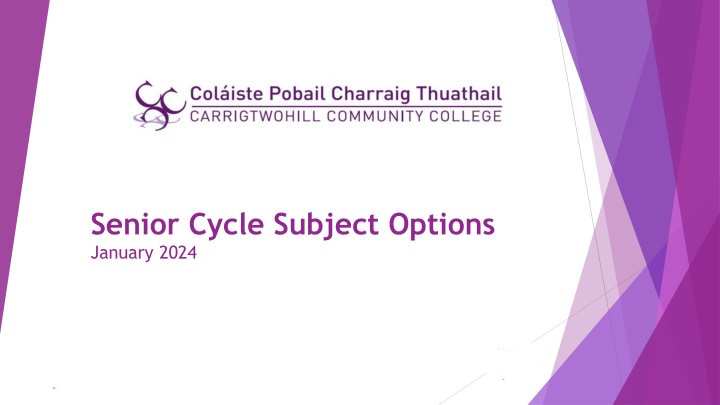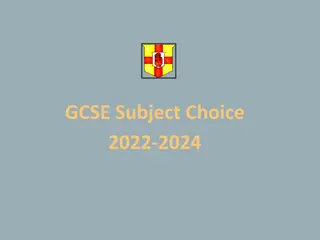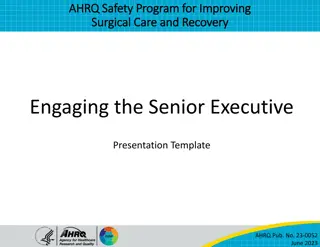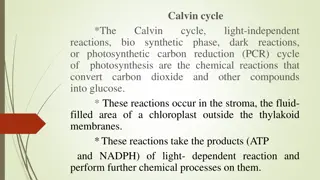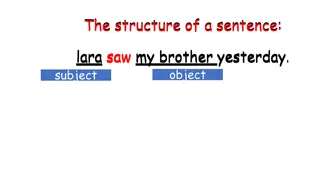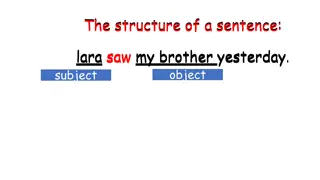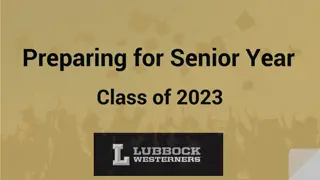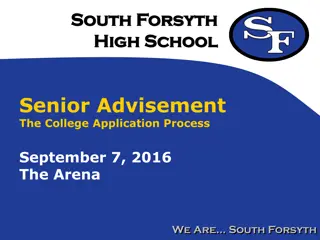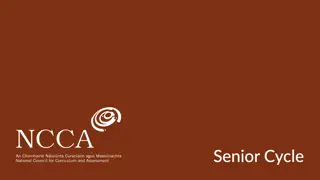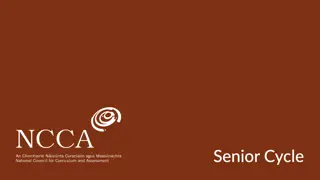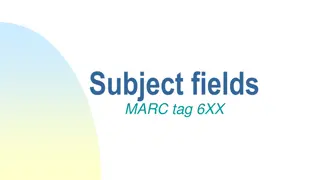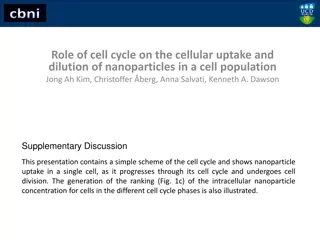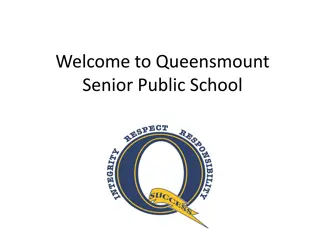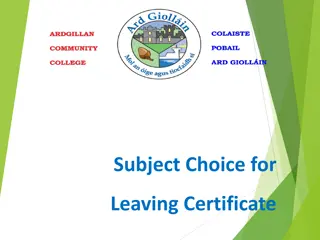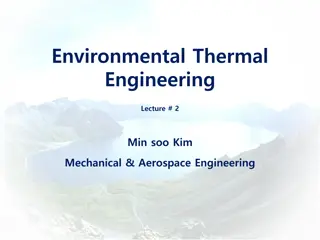Senior Cycle Subject Options
To select the best senior cycle subjects, consider your strengths from Junior Cycle, explore practical elements of each subject, match your skills and talents to related subjects, and align your interests with potential career paths. By making strategic choices based on personal factors, you can enhance your learning experience and maximize future opportunities.
Download Presentation

Please find below an Image/Link to download the presentation.
The content on the website is provided AS IS for your information and personal use only. It may not be sold, licensed, or shared on other websites without obtaining consent from the author.If you encounter any issues during the download, it is possible that the publisher has removed the file from their server.
You are allowed to download the files provided on this website for personal or commercial use, subject to the condition that they are used lawfully. All files are the property of their respective owners.
The content on the website is provided AS IS for your information and personal use only. It may not be sold, licensed, or shared on other websites without obtaining consent from the author.
E N D
Presentation Transcript
Senior Cycle Subject Options January 2024
How do I choose the subjects that suit me? How do I choose the subjects that suit me? Firstly, look at your Junior Cycle results/class tests and find the subjects in which you perform(ed) well. Choosing subjects that you are best at will benefit you in attempting to gain the highest grade possible in it in the Leaving Cert. You should consider the subjects you enjoyed most during the Junior Cert cycle. Taking an interest in a subject will greatly help to motivate you when it comes to studying and allows the information to stick in your mind more easily. Remember the vast majority of courses on offer through the CAO are based on points and points only so it is important that you maximise your chances of achieving these by choosing your leaving cert subjects wisely. Make sure to include any subjects you might need for third level (either those specifically required for the course or those that might benefit your studies for that course e.g. Business/Accountancy for Commerce etc.
Consider the Practical Element Consider the Practical Element Art 62% practical 38% final exam Construction 25% practical 25% project 50% final exam DCG 40% practical 60% final exam Geography 20% fieldtrip 80% final exam Engineering 50% practical 50% final exam History 20% project 80% final exam Home Economics 20% project 80% final exam LCPE 30% Practical Performance 20% Physical Activity Project 50% Written Exam Computer Science 30% project 70% final exam
Your Skills and Talents Your Skills and Talents Creative skills you enjoy reading, creative writing, story-telling etc. English, History Mathematical Skills you are good at logical thinking, numbers and figures Higher Level Maths Physics Accounting Scientific Skills you enjoy collecting and analysing information and are good at memorising Chemistry Biology Physics Agricultural Science Geography
Practical Skills you enjoy making things, doing things and knowing how things work Engineering Construction Studies Home Economics Design and Communication Graphics (DCG) Computer Science Social Interests you enjoy learning about society (past and present) and the world around you History Geography Political Studies Business Skills you enjoy learning about the business world and everything to do with it: Business Accounting Economics Artistic skills you are talented and gifted in the arts and enjoy using your creativity Art Music
COMPUTER SCIENCE Subject Content Study of computers and computer programming How programming and computational thinking can be applied to the solutions of problems, and how computing technology impacts the world around us. o Strand 1: Practices and principals think like a computer scientist Design Process, Computers and Society, Ethics & Computers, Computational Thinking Strand 2: Core Concepts Abstraction, Algorithms, Data, Computer Systems, Evaluation/Testing Strand 3: Computer Science in practice Complete 4 Applied Learning Tasks project work preparing for final year project Languages currently being studied/examined: Python, HTML/CSS & Javascript
Exam Structure - 70% End of Course Examination Assessed at both Higher and Ordinary Level. - Exam takes place in May: - o Written Exam - Section A & B - 1 hours - 60% - 10 short & 2 long questions o Break hour o Computer Based - Section C - 1 hour - 40% 30% Coursework Assessment In 6th year, after Christmas, design brief set to generate a computational artefact & report in response to a brief set out by the SEC. - 2023 24% received H1 grade, 22% received H2, 18% received H3 1,986/230 students - 2022 19% received H1 grade, 21% received H2, 20% received H3 1,382/222 students -
Past Question 1 Past Question 2
Basic Requirements A strong knowledge of and interest in ICT skills Students who enjoy creating applications with computers Students who think logically and have an aptitude for maths & science Students who enjoy puzzling out and solving problems Students must be hard-working, disciplined, motivated, well organised and persistent Previous knowledge of computer programming would be of benefit, but is not a requirement Access to a laptop/computer at home would be very helpful but is not a requirement
Career prospects Working in Computing and ICT Software Development & Programming Designing video games Cloud Computing Working with Big Data monitoring online activities & trends Manufacturing Hardware AI Statistician/Actuary Data Analytics Engineering Skills are very transferable to a much broader range of career paths, the problem solving, logical thinking and programming skills developed in the course will be of value in many workplaces and activities.
Accounting Subject Content Students of accounting will be able to complete and understand: Company Final Accounts incl. manufacturing account Published Accounts Control Accounts Creditors & Debtors Revaluation/Depreciation of Fixed Assets Tabular Statement Correction of Errors & Suspense Accounts Budgeting Club Accounts Service Firm Accounts Farm Accounts Cash Flow Statements Job Costing Production Budgeting Interpretation/Analysis of Accounts
Exam Structure 3 hour exam 400 marks 3 Sections: Section 1: Financial Accounting 30% of overall exam o Section 2: Financial Accounting 50% of overall exam o Section 3: Management Accounting 20% of overall exam o Basic Requirements Accounting is a subject that suits the organized, methodical person who likes definite answers. There are no prerequisites for the study of accounting - just an interest in working with figures. It is an advantage but not essential to have studied Business Studies at Junior Cert. The course is numerically based but theory and procedures must be learned also. While the student needs to be comfortable with numbers he or she does not need to be at higher maths level. This course offers a hard working student the real possibility of high grades because of the unambiguous nature of the questions. An organised student who likes order will be particularly suited to this course.
For those considering studying accounting, actuarial studies [analysing the financial consequences of risk] or finance after the Leaving Cert it would be unwise to leave accounting out of their subject choice. It is also be an important subject choice for those thinking of starting their own business. While not required specifically for studying any third level college course, it is recommended if Accountancy is the career path you want to follow. Career prospects Accountancy & Taxation Sales, Retail & Purchasing Banking & Financial Services Business Management
AGRICULTURAL SCIENCE Subject Content Unit 1: Soils Chemical and Physical Properties, Management, Formation and Classification Unit 2: Animals Physiology, Systems, Management and Husbandry Unit 3: Crops Plant Physiology, Classification and Identification, Establishment, Management and Harvesting 22 Practical Activities Exam Structure Exam worth 75% of final grade Section A: Answer 10 short questions Section B: Answer 4 long questions Coursework worth 25% of final grade - Individual Investigative Study Thematic Topic Set by State Exam Commission collect and process data, evaluate evidence and develop arguments.
Basic Requirements Some experience of farming is beneficial. Very science heavy course Students should have a good understanding of Junior Cycle Science Each student must have an aptitude for and interest in laboratory work. A considerable amount of learning and study is necessary to do well in this subject Overlapping content with both Biology and Geography. Career prospects Farming, Horticulture and Forestry Biological, Chemical and Pharmaceutical Sciences Engineering, Manufacturing and Energy Animals and Veterinary Science Earth and Environment Biomedical Technologies and Medtech
APPLIED MATHS Subject Content Exam Structure Units and Vectors 2.5 Hour Exam (80%) Uniform Acceleration Mathematical Modelling Project (20%) Previous projects include: Projectiles Projectile motion in a sport (2023) Newton s Laws and Connected Particles Model an aspect of roller coaster motion (2024) Work, Power, Energy and Momentum Impacts and Collisions Motion in a Circle Difference Equations Differential Equations Networks and Graphs Optimal Paths
APPLIED MATHS BASIC REQUIREMENTS Higher Level Maths would be important. This would suit a problem solving and methodical person. There is quite a big overlap between Applied Maths, Physics, and Higher Level Maths. The ability to Mathematically model, which is the process of using mathematics to represent, analyse, make predictions and provide insight into real-world phenomena. Career Prospects Used in a variety of disciplines such as: Theoretical Physics Bioinformatics Robotics Image Processing Chemistry Economics Engineering Finance
BIOLOGY Subject Content Unit 1: Biology The Study of Life; The Scientific Method, Nutrition, Ecology Unit 2: The Cell Cell Structure, Respiration, Photosynthesis, Cell Division, Genetics Unit 3: The Organism Microbiology, Plant and Animal Systems 29 Mandatory Experiments Exam Structure Exam worth 100% of final grade Section A - short questions (answer 5 from 6) Section B experiments (answer 2 from 3) Section C long questions (answer 4 from 6)
Basic Requirements It is recommended that a student taking Leaving Certificate Biology has a good understanding of Junior Science. Each student must have an aptitude for and interest in laboratory work. A considerable amount of learning and study is necessary to do well in this subject Career prospects Farming, Horticulture and Forestry Biological, Chemical and Pharmaceutical Science Fashion and Beauty Medical and Healthcare Leisure, Sport and Fitness Maritime, fishing and aquaculture Animals and Veterinary Science Earth and Environment Biomedical Technologies and MedTech
CHEMISTRY Subject Content The course includes 28 mandatory practical experiments and theory relating to the following topics: Periodic Table and Atomic Structure, Chemical Bonding, Formulas, Equations and Calculations, Acids and Bases, Volumetric Analysis, Thermochemistry, Organic Chemistry, Rates of Reactions, Environmental Chemistry Water, Chemical Equilibrium Varies from lesson to lesson around theory, chemical equations, experiments, drawing chemical structures, maths/calculations. Chemistry is about understanding, it cannot be learned off by heart. Exam Structure Chemistry is available at both higher and ordinary levels. The Chemistry examination is 3 hours duration and is worth 100%. Both exam papers are divided into Sections A and B. Section A consists of three practical questions to do at least 2. Section B has 8 questions, to do 5 or 6. Mandatory practical questions are worth a minimum of 37.5% in the exam.
Basic Requirements It is recommended that a student undertaking the course has a good understanding of Junior Cycle Science. Each student should have an aptitude for and interest in laboratory work. A student would be expected to have a reasonable level of Junior Cycle Maths, either at higher or ordinary level. To excel in chemistry, students need to have a passion for science. It is challenging, but only if you don t work at it. Students must be hard-working, motivated, committed, focused and organised if you don t work at it you will quickly fall behind and find yourself under pressure. Career prospects Chemistry is an essential element in the study of careers including Medicine, Dentistry, Veterinary Science, Physiotherapy, Nursing, Pharmacy and Medical Laboratory Technology, Teacher, Pathology and Forensics. The study of Physics or Chemistry is required for all types of Engineering, Chemistry is studied in year one of most Engineering courses and its study is ongoing in Chemical Engineering. A H4 grade in higher level Chemistry is required by a number of third-level colleges for some scientific degrees including Human Nutrition, Dentistry, Pharmacy, Veterinary and others. Others: Careers in beauty, perfume, psychology, occupational therapy, nursing, cheffing.
Subject Overview Leaving Certificate Construction Studies provides students in the senior cycle of post-primary education with an introduction to the knowledge and skills involved in construction technology and construction materials and processes. Students develop their ability to communicate ideas and information and to apply accurate observation and scientific investigation through exploring materials and processes. Construction Studies is a continuation of Wood Technology, although it is not essential to have completed Wood Technology at Junior Cert Level.
Structure of Subject In a Construction Studies class, students are encouraged and motivated to engage with theoretical aspects of the construction industry and then provided with opportunities to build upon this learning by interacting with project and group work. Students are also presented with the opportunity to develop a sound grasp of woodworking techniques and skills based on practical experience through practical skill lessons and project work.
Assessment at Leaving Certificate Construction Studies is assessed at both Ordinary level and Higher level by means of: 1. A terminal examination paper (50%). 2. A practical test (25%). 3. A student project (25%). Note: These assessments are further explained on the next slide.
Assessment at Leaving Certificate Part I - Construction Theory and Drawing (50%) - Where students learn the practical and theoretical procedures in constructing a house. Students learn and practice this skill by drawing the detailed sections of a house to scale, learning the principles of creating a comfortable and environmentally friendly living environment and using the skills they have learned to design their own houses. Part II - Practical Skill (25%) - Students get a chance to demonstrate their practical woodworking skill in a practical skill test in May of Leaving Cert. Student are given 4 hours to construct a simple item from a given drawing using only hand tools. This a test of a student hand skills and ability to interpret a drawing. Part III - Course work project (25%) - This is where students partake in an individual project of their own choosing. The project must relate to a part of the course work they have studied. Students can do a number of different styles of project: Model of a building detail i.e. Model Roof. Model of a heritage building i.e. Thatched Cottage. Artefact i.e. Item of furniture.
Sample of Student Work Expectations Drawing Details Project Work Practical Skills Work
Student Achievements Below you can see the grades awarded for Construction Studies in 2019 for both Higher and Ordinary level.
Potential Careers This subject builds skills and knowledge that are particularly useful for careers in the Construction, Architecture and Property Sector. This includes the following careers: Civil Engineering. Skilled Trades Carpenter, Electrician, Plumber, etc. Construction Management & Planning. Architecture. Property Management and Auctioneering. Quantity Surveying.
Subject Overview Leaving Certificate D.C.G provides students in senior cycle an introduction into the knowledge and skills involved in graphics. It dives into the world of communicating in a graphical way with a strong focus on design. It will help you develop your ability to design products and become innovative in problem solving. As well as communicating on paper they will also develop skills on the Solidworks CAD program to create products that you design accurately and aesthetically. D.C.G is a continuation of Graphics at Junior Cert Level, but it is not essential to have done Graphics to take on DCG.
Structure of Subject DCG students are encouraged to develop their visualisation and creative thinking skills through the analysis and evaluation of both 2D and 3D graphic problems. They will communicate this with freehand sketching, traditional draughting and with C.A.D (Computer Aided Design). There are 2 main areas of study within the graphical communication areas- 1) Plane and descriptive Geometry 2) Applied Graphics These areas are offered in Higher and Ordinary levels of the subject.
Assessment at Leaving Certificate DCG is assessed at both Ordinary level and Higher level by means of: 1. A Board and Drawing Exam (60%). 2. A Design Project (40%).
Student Achievements Below you can see the grades awarded for D.C.G in 2019 for both Higher and Ordinary level.
Assessment at Leaving Certificate Part I - Drawing Exam (60%)- Students learn the Core topics in DCG. Students learn and practice this skill by drawing with a T-square, Board and setsquares etc... They will draw detailed solutions to the topics mentioned below. Learning the principles, axioms and theroms of each topic and will help them become very good problem solvers. These skills can carry over to other subjects like LC Engineering and Art where design is involved. Perspective Projection Lamina and Skew Lines Interpenetration The Oblique Plane
Assessment at Leaving Certificate Part II Project (40%)- In the 1st term of 6th year students will take on an individual design CAD based project. Here students will have to research an existing artefact design, present existing solutions in sketches and CAD and then create and present their own modified/new design. The student uses freehand sketching, graphic design and 3D modelling skills as modes of graphical communication to present their design solution. Each student must submit a 14 page A3 portfolio which shows their research, original sketches, detailed CAD drawings & Assemblies and .
Potential Careers Graphic Design. Architecture & Architectural Technician Skilled Trades Carpenter, Electrician, Plumber, etc. Interior Design- Whole house, Fitted Kitchens/Cabinets/Wardrobes etc.. Construction Engineer, Civil Eng., Building Surveyor. Engineering- Mechanical, Aeronautical, Automotive, Electrical,etc. . Product Design. Animation and Computer Generated Imagery CGI. Manufacturing/ Automation/ Production design
Leaving Certificate Engineering is the study of mechanical engineering. Students develop skills and initiative in the planning, development and realisation of technological projects in a safe manner. There are two main areas of study: workshop processes, and materials and technology. About Engineering at Leaving Certificate:
Why Study Engineering Engineering gives students hands-on experience of working with hand tools and power tools. Students also undertake theoretical work for their final examinations which provides useful skills for those considering a career in the sector of any form of engineering.
What kind of Student would Engineering suit: The subject follows on from Junior Cert Engineering. Ideal for anyone that has sat the subject at Junior Cert but Each student should have an aptitude for and an interest in design and practical work. Someone that enjoys creating and problem solving. Someone that enjoys fixing things and understanding how different things work.
3rd Level College courses: Apprenticeships/ Employment: Engineering courses: Mechanical, electrical, chemical, Manufacture & Design, environmental & Biomedical. Construction. Mechanic. panel beater. Possible Courses & Career Paths/ Apprenticeships: Welder. Plumber. Architecture. aircraft technician. Product design. army/air corps Biomedical Sciences. Electrician. Many more .. Many more
Practical Project:Students are required to submit a model and design folio based on the brief. This is worth 25% of the overall marks for Higher Level Engineering and 30% at Ordinary Level. Day Practical: Students are given 6 hours to complete a small mechanism project. This takes place in schools in May. Students are required to show skills of drilling, machining and fitting and precision filing. This is worth 25% for Higher Level and 30% for Ordinary Level Engineering Students. Assessment: 2 Practical & 1 Written element. Written exam: Lasting 3 hours at Higher Level and 2.5 hours at Ordinary Level. This is worth 40% at Ordinary level and 50% at Higher level. The exam is made up of 8 questions, in which students must answer Question 1, and any other four questions from the remaining seven.
GEOGRAPHY CORE UNIT-INCLUDES PHYSICAL& REGIONAL TOPICS, SKILLS BASED MATERIAL, FIELDWORK ELECTIVE UNIT: HUMAN ENVIRONMENT OR ECONOMIC GEOGRAPHY OPTION-HIGHER LEVEL GEOECOLOGY
Physical Here we examine in more details some of the topics which you will have covered at Junior Cycle. These include: Plate tectonics Volcanoes/ Earthquakes Rocks Weathering/Erosion/Mass Movement Rivers, Coasts and Glaciation
Regional Here we examine the world around us in more detail, locational geography Define what a region is Explore the types of regions - for example religious, regions defined by language The issues which might arise in those regions We also explore the economic activities in each region we study- so Primary, secondary and tertiary economic activity Look at if they are a core or peripheral region The Human processes of that region- Population structure, migration
Skills and Investigation Covers things like map work, direction, measuring and sketching skills Develop your skills to interpret the physical landscapes on an OS map Interpret the human and economic landscapes Graph and table reading and how to display information using those items These skills can transfer into many areas of work and even study in college They are also essential to the field work part of the course
Field Study/ Investigation Accounts for 20% of your overall exam result. Is conducted before the exam Usually in 6th year Involves day to site-using skills developed and practiced in class Location-Killeagh Woods, East Cork (Fluvial/River investigation)
Elective Unit: Economic or Human You will study either human or economic geography (this will be decided at a later date by the Geography Department in CCC Human Geography: the study of people and places-eg population, migration, etc Economic Geography: the study of commercial activities and the exploitation of resources for economic gain Usually studied in 6th year
Option Unit: Geo Ecology This unit is for higher level students only This unit covers two main topics: 1) Soils 2) Biomes This unit is studied in 6th year
